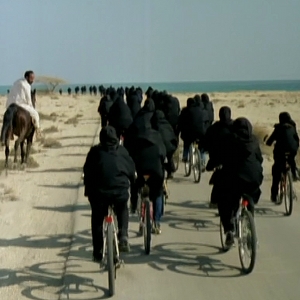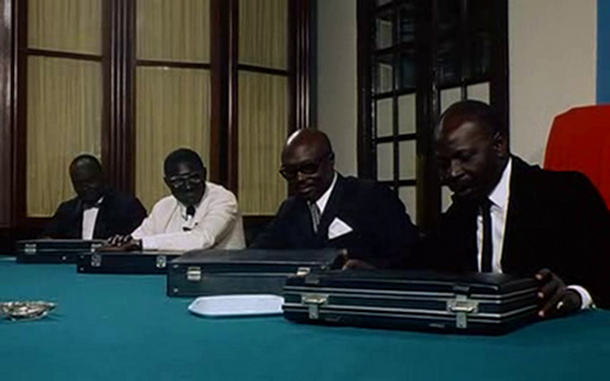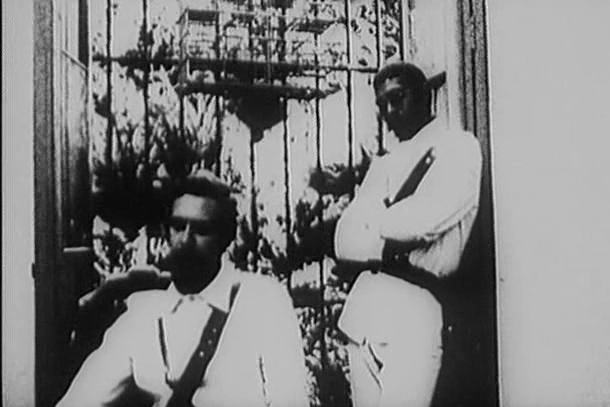
Cast: Yane Barry, Bernard Bresson, Greg Germain
Director: Med Hondo
Country: France | Mauritania
Genre: Drama
Editor’s Notes: “Third Cinema” was sociopolitical film movement deriving from third world nations during the 1960s and 70s.
When I seek out African cinema, my criterion are as follows: it must be made by a native African, and shot at least mostly in Africa using a mostly African cast. My ideal African film is all of those, but it also would speak to and for Africans, to the extent that any one or few individuals can speak for a nation or continent or group of people. When I seek out Third Cinema, a sociopolitical film movement of sorts that culls from all third world nations a certain veracity and galvanizing revolutionary force, I’m looking for something that offers me a unique perspective on social and political upheaval and first world imperialism. I’m looking for a filmmaking style untethered to western norms and fully engaged with its audience. Oh, Sun is precisely this kind of film. Made by a native Algerian working out of neighboring Mauritania, which had only 7 years prior gained its independence from France, and France, the film is shot mostly in France, which troubles its status as Third Cinema. That said, the film’s utmost concern is with the plight of migrant workers lured to mainland France by its colonialist constituents in French West Africa with the promise and veneer of a better life.
…the film’s utmost concern is with the plight of migrant workers lured to mainland France by its colonialist constituents in French West Africa with the promise and veneer of a better life.

When the African protagonist, who isn’t referred to by name, makes his way to France, he encounters a so-called “civilized” society filled with gawking white strangers, veiled and not-so-veiled racism, a chronic inability to find work and horrible living conditions. Whites speak of a “Black invasion” and fear a societal takeover while they crowd immigrants into rundown housing and ask them to perform the labor they feel themselves above. If this sounds like precisely the kind of issue occurring in the US with Latin American immigrants, I also felt a very strong correlation between the two. I can’t claim to know much about the French colonization of Africa, but it strikes me that a similar facade was put forth by the French in Africa as has been perpetuated by the US worldwide; that of a better and freer nation free of the ethnic violence and tribal warfare that plagues, and plagued, these colonized and formerly colonized nations. Therein lies the central hypocrisy at the heart of the US, and colonial France’s, foreign policies. We lure the destitute of the world in with promises of wealth and freedom and proceed to oppress and exploit them when they do manage to make it here. Their resentment of us for this is used as justification for war and continued aggression.
The film is a docu-fiction drama, with small interview segments and tangentially surreal moments scattered throughout.
Oh, Sun doesn’t take its premise this far, and is probably better off for narrowing its focus to the confines of mainland France and the immigrants within. The film is a docu-fiction drama, with small interview segments and tangentially surreal moments scattered throughout. The Mauritanian man is schooled to become more identical to his French neighbors, “bleaching” himself in the process. He’s asked to accept Jesus, though he comes from a Muslim nation. His attitude is exceptionally conciliatory, despite his circumstances. He jokingly speaks with a white man in racially charged dialogue, and joins a chorus of his fellow African immigrants in reciting joyfully a very racist French song mentioned by a black man as African in origin. A bourgeois French woman speaks to a friend about sleeping with a black man and whisper in each other’s ears things they’d heard about their sexuality. She later picks him up, sleeps with him and expresses disappointment that she didn’t experience what she’d expected to. This is only one point in a larger attempt to underline the lack of civility in the purportedly civilized. Even the liberal French, who claim they have “nothing against” the immigrants, can’t help but devolve into racial discrimination and hate speech.
After a horrifying dream, the Mauritanian man scurries from his room, likely attempting to find a way home. In his aimless wandering, he stumbles upon a rural French family who corral him into their group and head for their log cabin home in the wilderness. The man sits stoically as the family serves dinner, only for the dinner to turn into a virtual celebration of wasted food as the children throw and walk all over the table as the parents encourage them. No doubt this slap in the face is the final straw that sends the man wordlessly away from the table and into the woods, where he hears primal screams and calls to his native habitat as portraits of Malcolm X, and presumably other such leaders that I couldn’t readily identify, burn around him. The film ends with an ominous, “To be continued…” Med Hondo’s directorial debut, it’s not as polished or as formally assured as Sembene’s work at the time, but it’s a worthy entry into the Third Cinema canon.
[notification type=”star”]78/100 ~ GOOD. Med Hondo’s directorial debut, it’s not as polished or as formally assured as Sembene’s work at the time, but it’s a worthy entry into the Third Cinema canon.[/notification]



